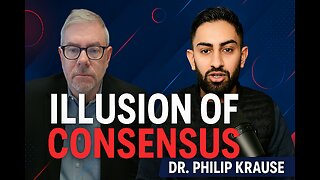Premium Only Content

PREDICTIVE PROGRAMMING: Part I
WHAT IS PREDICTIVE PROGRAMMING?
Depending on who you're asking, Predictive Programming is considered a "conspiracy theory" that suggests powerful entities, such as governments or elites, use fictional media like movies, books, and TV shows to psychologically condition the public to accept future events or societal changes.
The theory posits that by introducing these concepts in a fictional context, the public becomes more familiar and accepting of them, reducing potential resistance when they occur in real life.
Key points about predictive programming include:
Origins: The theory was first proposed by Alan Watts and popularized by figures like Alex Jones and David Icke.
Examples: Notable examples include the depiction of a ship similar to the Titanic in Morgan Robertson's novel "The Wreck of the Titan or Futility" (1898), and episodes of "The Simpsons" that seemingly predict future events like the 9/11 attacks.
Mechanism: The theory suggests that by embedding these future events in media, the public's subconscious is influenced, making them more likely to accept these events as natural or inevitable when they occur.
Criticisms: Critics argue that the theory is based on logical fallacies, lacks scientific rigor, and is often used to explain any coincidence or similarity between media and real events.
In the mainstream narrative Predictive Programming is not deemed a scientifically recognized theory.
Instead, it is generally considered a part of conspiracy culture.
-
![Nintendo Switch It UP Saturdays with The Fellas: LIVE - Episode #13 [Mario Kart 8 Deluxe]](https://1a-1791.com/video/fww1/97/s8/1/1/g/A/z/1gAzy.0kob-small-Nintendo-Switch-It-UP-Satur.jpg) 3:33:38
3:33:38
MoFio23!
18 hours agoNintendo Switch It UP Saturdays with The Fellas: LIVE - Episode #13 [Mario Kart 8 Deluxe]
63.8K2 -
 23:24
23:24
MYLUNCHBREAK CHANNEL PAGE
19 hours agoDams Destroyed Turkey
109K94 -
 7:24:43
7:24:43
SpartanTheDogg
12 hours agoPro Halo Player
66.2K1 -
 11:29
11:29
Tundra Tactical
12 hours ago $3.84 earnedGEN Z Brit 3D Prints a WORKING Gun Pt.3!
63.4K5 -
 8:07:55
8:07:55
AdmiralSmoothrod
14 hours agoark ascended - its dino time again
39.4K2 -
 2:08:21
2:08:21
The Illusion of Consensus
9 days agoFormer FDA Official Dr. Philip Krause On White House Pressure To Approve Covid Vaccines at the FDA
74.9K61 -
![[Sabatoge Saturday] Monster Hunter Wilds - w/ Dio!! [crashed at end]](https://1a-1791.com/video/fww1/9d/s8/1/5/g/F/z/5gFzy.0kob-small-Sabatoge-Saturday-Monster-H.jpg) 7:32:40
7:32:40
CHiLi XDD
13 hours ago[Sabatoge Saturday] Monster Hunter Wilds - w/ Dio!! [crashed at end]
27.2K3 -
 8:34:09
8:34:09
RyuMuramasa✧
12 hours agoBlade of Vengeance | The First Berserker: Khazan | LIVE Playthrough!
24.8K -
 1:50:26
1:50:26
Darkhorse Podcast
18 hours agoThere’s a New Tariff In Town: The 271st Evolutionary Lens with Bret Weinstein and Heather Heying
70.1K58 -
 29:36
29:36
The Brett Cooper Show
3 days ago $5.63 earnedThe Non-Binary Samurai Game No One Wanted | Episode 19
59.5K41